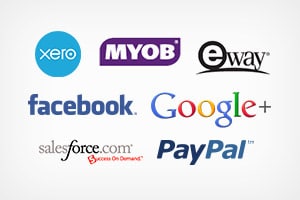What APIs Are and Why Your Website Needs Them for Business to Thrive

There are many commercial benefits to be had by connecting your website or mobile apps to third-party software using APIs. Unfortunately, the information out there surrounding APIs can often be quite jargon-heavy and difficult to get your head around. Here’s a quick rundown of what they are and what they can do for your business.
What are APIs?
To put it simply, an API, or Application Programming Interface, is a set of coding rules that allow for communication between two (or more) web-based systems. Through a common language for sharing data, information is shared back and forth between the systems at an agreed upon time interval – often immediately, in real time.
How are they used?
There are virtually limitless possibilities for using APIs (sometimes known as WebHooks) to connect your website to other web services, so here’s just a few examples of how businesses are using them today:
1. Sharing data from your website to a third-party system in real time:
Most web-based systems you use today to run your business have APIs that mean they can be updated automatically and immediately with information from your website. This includes:
- Feeding your online customer orders and inventory data into your MYOB accounting package
- Updating the details and status of your website initiated sales prospects in your Salesforce CRM
- Sending your customers automated marketing emails in an email system such as Campaign Monitor based on their demographics or current stage in the sales cycle
2. Retrieving data immediately from external applications to feed into your website:
In the same way that you can feed data out, you can also have your website set up to receive information from third-party systems. A major benefit of doing this is that it can streamline the experience of your customers to ensure they don’t have to leave your website to interact with any of the other online services you utilise. For example:
- Connect your Zendesk customer service portal to your website so that your customers can log and receive responses to support queries from within your website
- Send stock and order status details from your SugarCRM or inventory management system to your website so that customers can see in real time what’s happening with their online order
- Pull competitor price comparisons into your ecommerce website from various shopping feeds around the internet
- Plug your JIRA project management system into your website so that clients can instantly see the progress and cost of the work being completed for them.
3. Integrating popular web services into your website or mobile apps:
There are a wealth of free services on the web that can be integrated into your website to add powerful and useful functionality for your customers. Some examples include:
- Add Google Maps functionality to your booking website to show customers where your services are located and the best route to take between points you service
- Integrate YouTube videos of product reviews and demonstrations into your website content to bridge the gap between online and personal selling
- Connect your site to Google Analytics to receive up-to-date information about your website visitors and how to optimise your website.
What are the benefits to my business?
As you can see from some of the examples above, connecting your website to external services through APIs can introduce a range of benefits for both you and your customers. The most compelling of these are:
1. Increased efficiency:
By integrating and automatically updating multiple business systems at once, you can ensure that:
- Orders are placed and fulfilled faster, so you can get more business done in less time
- Customers receive updates from you in real time about the status of their orders, resulting in less time spent answering customer support phone calls and emails
- Information is synchronised across all areas of the business – so everyone from account managers, marketing, finance and senior executives are on the same page, at the same time.
2. Improved accuracy:
Many businesses find that automating the flow of information from one business system to another means they’re suddenly no longer having to manually update their third-party business applications. In addition to increased efficiency, this also means improved accuracy of information across systems including:
- Customer order information matches exactly what the customer entered (with the ability to add address validation APIs that ensure customers enter their addresses accurately from the start)
- Financial and accounting records match exactly with current orders and inventory levels
- Customer expectations are managed by keeping them informed on an ongoing basis.
3. Reduced costs:
As well as reducing the need to manually update various systems while improving the accuracy of information within those systems, APIs can also present significant cost savings potential for your website development. With a number of powerful web tools made available free of charge for commercial use by large corporations like Google, you can add incredibly sophisticated technology to your website without having to pay for that functionality to be built from the ground up. So what’s in it for them? Organisations like Google, Yahoo, Paypal, Dropbox, FedEx, Facebook and Xero open up their SaaS applications so that developers can extend their functionality – and in turn, increase their usefulness and usage across the web. Think of it like advertising, only vastly more powerful – since your clients and customers are getting significant value out of their use of the third-party tool.
Find out more
To find out how you can integrate your various business systems with your website to improve service and cut costs, contact our team of digital strategy experts at 4mation Technologies. We’ll be happy to meet with you for an obligation-free chat to outline how we can assist in your specific business situation.

